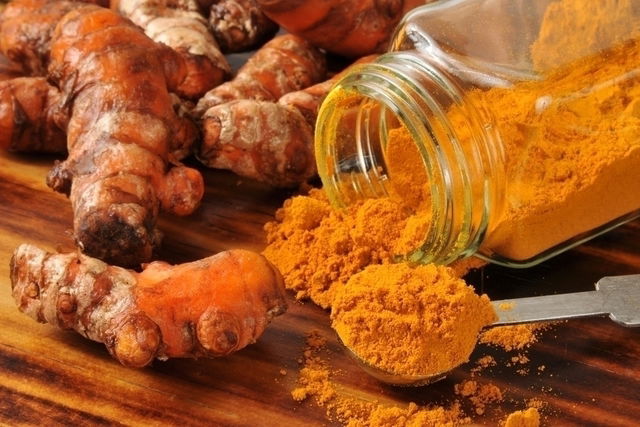Turmeric, also known as curcuma, is a type of flowering plant with roots that contain medicinal properties. These roots are usually ground up into a powder, which is commonly used to season meat or vegetables, especially in India and eastern countries.
As well as having great antioxidant potential, turmeric can also be used as a natural remedy to relieve gastrointestinal disorders, fever, colds, and even to lower high cholesterol levels.
Turmeric is a plant measuring around 60 cm and it has long, shiny leaves and long orange roots. Scientifically known as Curcuma longa, it can be found in some natural health stores, pharmacies, and grocery stores.

Health benefits
Turmeric has anti-inflammatory, anti-oxidant, anti-bacterial, and digestive-aiding compounds. Therefore it has many health benefits such has:
1. Preventing cancer
Turmeric contains phenolic compounds with antioxidant and anti-inflammatory properties to prevent the development of some types of cancer, like colon, breast, intestinal, bladder and bone marrow cancers.
This plant can also combat cancerous cells and increase the therapeutic effect of chemotherapy and radiation therapy. However, more studies are needed to support the effects of turmeric against cancer.
2. Reducing cholesterol
Due to its antioxidant proeprties, turmeric can help to reduce LDL cholesterol and triglyceride levels in the blood. This can be beneficial for the prevention of cardiovascular diseases like heart attack, stroke and atherosclerosis.
3. Relieving pain
When used for therapeutic purposes, turmeric can help to relieve headaches and joint pain. It can be used for rheumatoid arthritis, for example, which is associated with joint inflammation that causes pain and difficulty moving.
4. Promoting weight loss
Turmeric can help with weight loss due to its thermogenic action. It can stimulate increased fat and energy burning.
Turmeric can also help to reduce inflammatory markers in the blood, which can become elevated in cases of obesity.
5. Preventing neurodegenerative diseases
Turmeric contains potent antioxidant and anti-inflammatory action that helps to boost cognitive capacity and prevent neurodegenerative diseases like Alzheimer’s, Parkinson’s or dementia.
6. Managing diabetes
This medicinal plant improves pancreatic cell function. This organ is responsible for insulin secretion, which is needed for blood sugar management. Therefore, using turmeric is a great option for patinets with insuling resistance or diabetes.
7. Preventing allergy-related conditions
Some studies [1],[2], show that turmeric can help to prevent allergy-related conditions, like allergic rhinitis, allergic sinusitis and asthma. It inhibits the production of cytokines and IgE, which are substances that the immune system boosts production of during allergy flare-up
8. Treating intestinal problems
Because of its anti-inflammatory and digestive properties, turmeric is often recommended as a complementary treatment for inflammatory bowel diseases, like Crohn’s disease and ulcerative colitis.
9. Improving skin health
Because of its anti-inflammatory, antimicrobial and antioxidant action, turmeric can be prescribed in cream or capsule form to complement the medical treatment of skin issues like acne, alopecia, dermatitis, lichens planus or psoriasis.
10. Complimenting depression treatment
Turmeric can impact the balance between serotonin and dopamine, which are neurotransmitters that are essential for wellbeing and good mood. Therefore, turmeric can be a great option to complement the treatment of illnesses like depression, anxiety or stress.
Additionally, turmeric can also help to inhibit the formation of blood clots and even contributes to relieving premenstrual cramps.
How to use turmeric
The most common way of buying turmeric is as a ground-up powder made from the plant’s roots. This powder can be used to season food, however, there are also turmeric capsules available for purchase. Alternatively, leaves from the turmeric plant can also be used for making turmeric tea.
- Turmeric powder: Place 1 teaspoon of turmeric powder in 150 ml of boiling water and let it infuse for 10 to 15 minutes. Then allow it cool down, and drink up to 3 cups a day, in between meals;
- Turmeric capsules: generally the recommended dosage is two 250mg capsules every 12 hours, adding to a total of 1 gram per day. However, dosage may vary depending on the underlying need for treatment ;
- Turmeric gel: Mix a tablespoon of aloe vera with ground turmeric and apply on skin inflammations such as psoriasis.
Possible side effects
Side effects like stomach irritation and nausea can occur after excessive intake of turmeric.
Who should avoid consuming turmeric
Even though it has several health benefits, turmeric is not advised for patients who are taking anticoagulants or patients who have bile duct obstruction due to gall stones. Additionally, turmeric should only be taken under doctor supervision during pregnancy or lactation.
